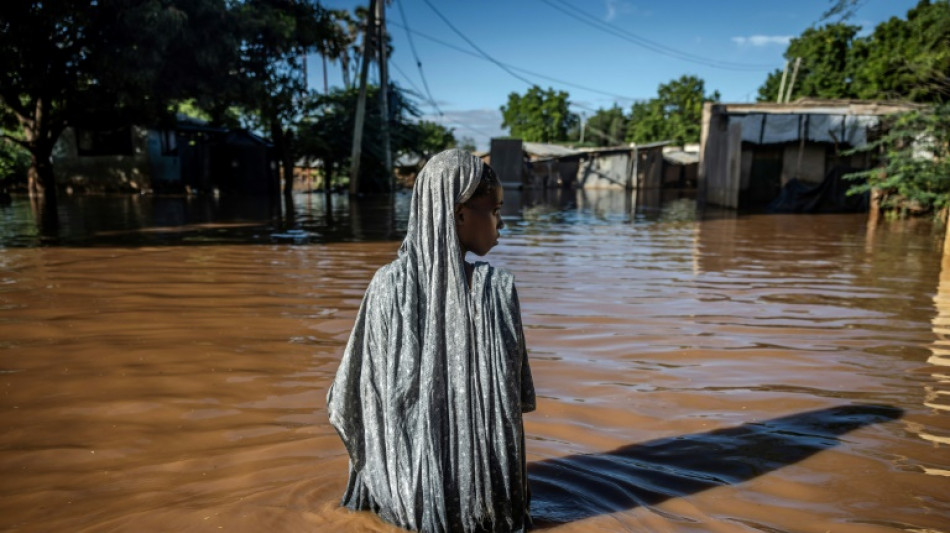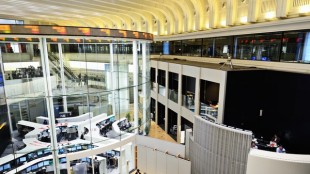
-
 Noel takes narrow lead after Alta Badia slalom first run
Noel takes narrow lead after Alta Badia slalom first run
-
Stocks diverge as rate hopes rise, AI fears ease

-
 Man City players face Christmas weigh-in as Guardiola issues 'fatty' warning
Man City players face Christmas weigh-in as Guardiola issues 'fatty' warning
-
German Christmas markets hit by flood of fake news

-
 Liverpool fear Isak has broken leg: reports
Liverpool fear Isak has broken leg: reports
-
West Indies captain says he 'let the team down' in New Zealand Tests

-
 Thailand says Cambodia agrees to border talks after ASEAN meet
Thailand says Cambodia agrees to border talks after ASEAN meet
-
Alleged Bondi shooters conducted 'tactical' training in countryside, Australian police say

-
 Swiss court to hear landmark climate case against cement giant
Swiss court to hear landmark climate case against cement giant
-
Knicks' Brunson scores 47, Bulls edge Hawks epic

-
 Global nuclear arms control under pressure in 2026
Global nuclear arms control under pressure in 2026
-
Asian markets rally with Wall St as rate hopes rise, AI fears ease

-
 Jailed Malaysian ex-PM Najib loses bid for house arrest
Jailed Malaysian ex-PM Najib loses bid for house arrest
-
Banned film exposes Hong Kong's censorship trend, director says

-
 Duffy, Patel force West Indies collapse as NZ close in on Test series win
Duffy, Patel force West Indies collapse as NZ close in on Test series win
-
Australian state pushes tough gun laws, 'terror symbols' ban after shooting

-
 A night out on the town during Nigeria's 'Detty December'
A night out on the town during Nigeria's 'Detty December'
-
US in 'pursuit' of third oil tanker in Caribbean: official

-
 CO2 soon to be buried under North Sea oil platform
CO2 soon to be buried under North Sea oil platform
-
Steelers edge Lions as Bears, 49ers reach playoffs

-
 India's Bollywood counts costs as star fees squeeze profits
India's Bollywood counts costs as star fees squeeze profits
-
McCullum admits errors in Ashes preparations as England look to salvage pride

-
 Pets, pedis and peppermints: When the diva is a donkey
Pets, pedis and peppermints: When the diva is a donkey
-
'A den of bandits': Rwanda closes thousands of evangelical churches

-
 Southeast Asia bloc meets to press Thailand, Cambodia on truce
Southeast Asia bloc meets to press Thailand, Cambodia on truce
-
As US battles China on AI, some companies choose Chinese

-
 AI resurrections of dead celebrities amuse and rankle
AI resurrections of dead celebrities amuse and rankle
-
Arrive AI to Attend CES 2026 to Engage Industry Leaders on the Future of Autonomous Delivery and AI-Driven Logistics

-
 Guanajuato Silver Receives TSXV Conditional Approval for Bolanitos Acquisition
Guanajuato Silver Receives TSXV Conditional Approval for Bolanitos Acquisition
-
Brenmiller Energy CEO Avi Brenmiller Issues Year-End Letter to Shareholders

-
 1933 Industries Achieves Positive Income in Q1 2026, Marking Third Consecutive Profitable Quarter
1933 Industries Achieves Positive Income in Q1 2026, Marking Third Consecutive Profitable Quarter
-
New Joint Initiative to Tackle Core Identity Challenge For The Global Precious Metals Industry

-
 Best Western Plus Lamplighter Inn & Conference Centre recognized with 2026 Consumer Choice Award for Hotel in London
Best Western Plus Lamplighter Inn & Conference Centre recognized with 2026 Consumer Choice Award for Hotel in London
-
CoTec Investment MagIron Acquires Reynolds Pellet Plant and Launches United States Based DR Grade Pellet and Merchant Pig Iron Strategy

-
 Saat & Saat Acquires Turkish Apparel Leader Aydinli Group, Expanding U.S. Polo Assn. Markets Across Turkey, the Middle East, Eastern Europe, and North Africa
Saat & Saat Acquires Turkish Apparel Leader Aydinli Group, Expanding U.S. Polo Assn. Markets Across Turkey, the Middle East, Eastern Europe, and North Africa
-
EON Resources Inc. Reports Management and Directors Buy an Additional 282,000 Shares of EON Class A Common Stock for a Total of 1,561,000 Shares Bought in 2025 and a Total Ownership of Over 5 million Shares

-
 Heirs Energies Agrees $750m Afreximbank Financing to Drive Long-Term Growth
Heirs Energies Agrees $750m Afreximbank Financing to Drive Long-Term Growth
-
Black Book Poll: "Governed AI" Emerges as the Deciding Factor in 2026 NHS Procurement

-
 Hemogenyx Pharmaceuticals PLC Announces Update on Admission of Shares
Hemogenyx Pharmaceuticals PLC Announces Update on Admission of Shares
-
Pantheon Resources PLC Announces Shareholder Letter and Corporate Update on Dubhe-1

-
 Tocvan Begins Trenching Material for the Pilot Mine and Pushes Ahead With Infrastructure Development
Tocvan Begins Trenching Material for the Pilot Mine and Pushes Ahead With Infrastructure Development
-
Steelers receiver Metcalf strikes Lions fan

-
 Morocco coach 'taking no risks' with Hakimi fitness
Morocco coach 'taking no risks' with Hakimi fitness
-
Gang members given hundreds-years-long sentences in El Salvador

-
 Chargers, Bills edge closer to playoff berths
Chargers, Bills edge closer to playoff berths
-
Gang members given hundred-years-long sentences in El Salvador

-
 Hosts Morocco off to winning start at Africa Cup of Nations
Hosts Morocco off to winning start at Africa Cup of Nations
-
No jacket required for Emery as Villa dream of title glory

-
 Amorim fears United captain Fernandes will be out 'a while'
Amorim fears United captain Fernandes will be out 'a while'
-
Nigerian government frees 130 kidnapped Catholic schoolchildren


COP29 fight looms over climate funds for developing world
The developing world needs trillions of dollars in climate aid, but who should pay for it? Wealthy nations? Big polluters? Countries that got rich burning fossil fuels? All of the above?
A fight over this question looms at crucial negotiations next month as China and other major emerging economies come under pressure to chip in for climate action in poorer countries.
It is hoped a new deal can be struck at the UN COP29 climate conference to greatly lift financial assistance to countries least able to reduce carbon emissions and adapt to global warming.
The present bill of $100 billion a year is footed by a list of countries that were the richest and most industrialised at the time the UN climate convention was written up in 1992.
These donors -- including the United States, the European Union, Canada, Japan and others -- agree more money is needed, and intend to keep paying "climate finance" where it is needed most.
But they want others to share the burden, specifically developing countries that have become more prosperous and polluting in the decades since the original donor list was drawn up.
China –- today the world's largest polluter and second-largest economy –- is the obvious target, but Singapore and oil-rich Gulf states like Saudi Arabia could also come under scrutiny.
It is "entirely fair to add new contributing parties, given the ongoing evolution of economic realities and capabilities", the United States wrote in an August submission to the UN Framework Convention on Climate Change (UNFCCC).
- 'Bad faith' -
Diplomats from other developed countries have echoed this, arguing that the contributor list is based on outdated notions of rich and poor, and anyone who can pay should pay.
Some have proposed revised criteria against which potential contributors might be judged, such as income levels, purchasing power or their emissions of planet-warming greenhouse gases.
Calls to widen the donor base are deeply unpopular and have sparked heated exchanges in the months before COP29, which is being hosted in oil-and-gas-rich Azerbaijan, itself classified as a developing country.
Donors have been accused of forcing the matter onto the negotiating table while refusing to engage on the central question of how much they intend to pay.
For some involved "this was the literal definition of negotiating in bad faith", said Iskander Erzini Vernoit from the Imal Initiative for Climate and Development, a think tank based in Morocco.
It has "taken up a lot of airtime, and a lot of oxygen", he told AFP.
"For the sake of all of the poorest, most vulnerable countries of the world, it's not fair to hold the whole thing hostage."
Developing countries are pushing for the strongest possible commitment at COP29 to ensure adequate funding for clean energy projects, defensive sea walls and other climate adaptation measures.
Negotiators are nowhere near landing a concrete figure, but some developing countries are calling for over $1 trillion annually.
In a UNFCCC submission in August, the EU warned "the collective goal can only be reached if parties with high GHG-emissions (greenhouse gas) and economic capabilities join the effort".
- Tough talk -
For developing countries, who pays is non-negotiable: the 2015 Paris climate agreement reaffirmed that developed countries disproportionately responsible for global warming to date pick up the tab.
In a joint statement in July, China, India, Brazil and South Africa strongly rejected "attempts by developed countries to dilute their climate finance legal obligations under international law".
Azerbaijan's chief negotiator Yalchin Rafiyev told AFP in September that the gap between the United States and China over the issue was "narrowing", with a "softening" of stances on both sides.
China, like some other developing countries, actually pays climate finance, it just does so on its own terms.
Between 2013 and 2022, China paid on average $4.5 billion a year to other developing countries, the World Resources Institute (WRI) wrote in a September paper.
This amounted to roughly six percent of what developed countries paid over the same period, said the US-based think tank. China is not required to report this to the UNFCCC, and it is not counted toward the collective target.
Analysts say any formal additions to the donor list at COP29 are very unlikely, though some countries may agree to voluntary contributions in support of the broader goal.
S.Gregor--AMWN



